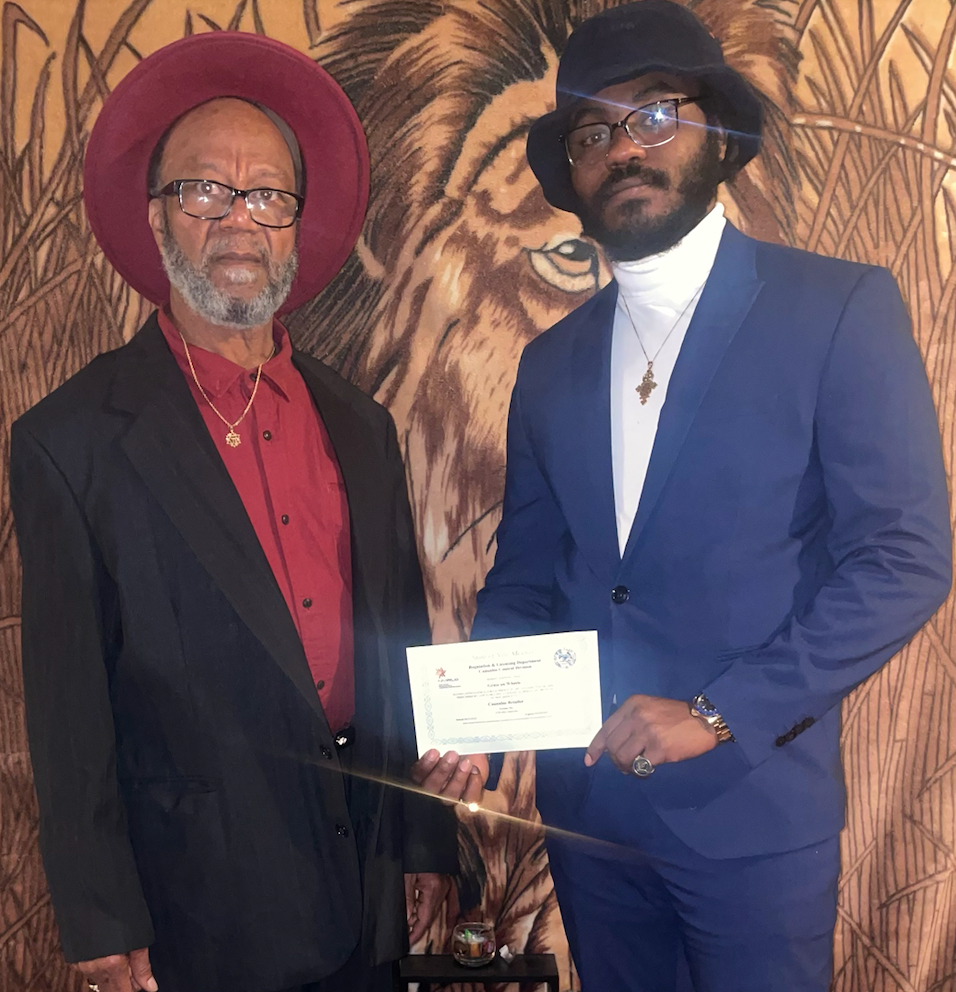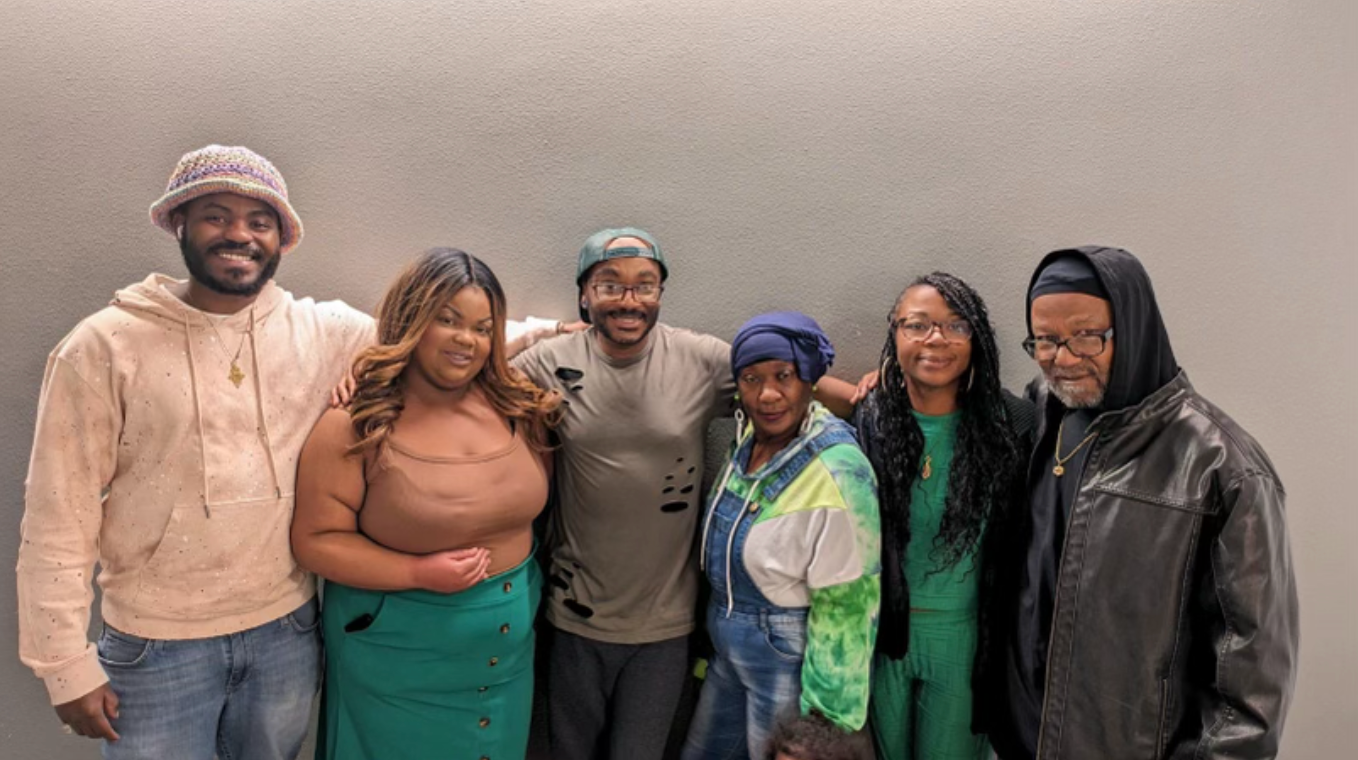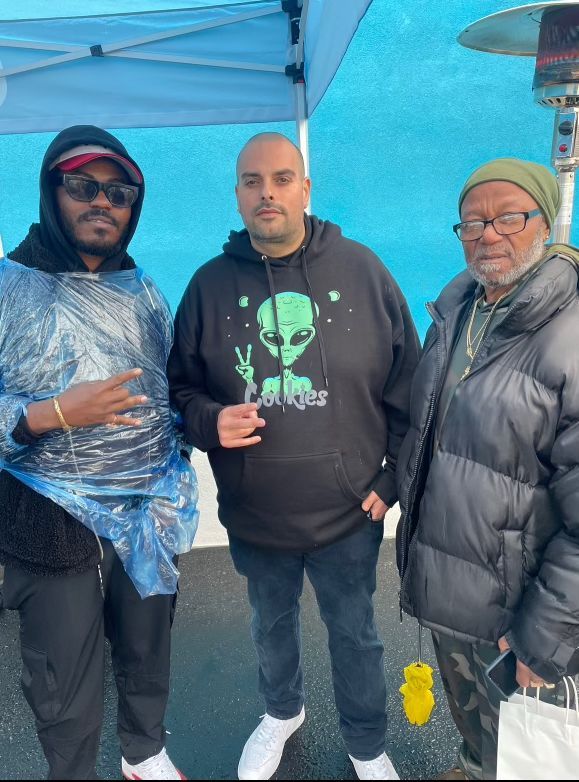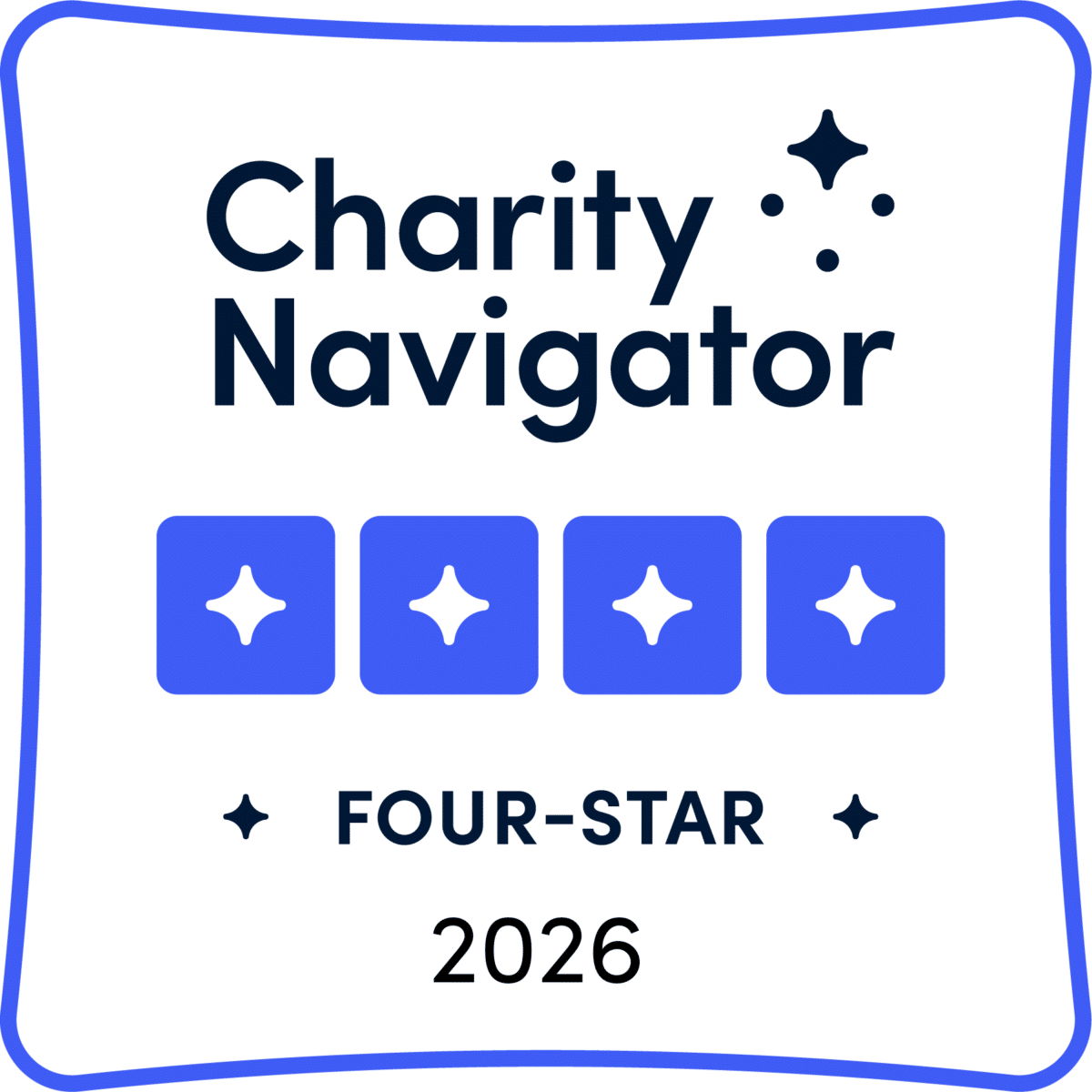Unlocking the Human Spirit: Elliston Callwood's Journey from Incarceration to Advocacy
In a world where the perception of cannabis has been rapidly evolving, and laws surrounding its
use have been changing, there's a story that demands our attention. It's the story of Elliston
Callwood, a man who, like many others, found himself trapped by the harsh legal consequences
of cannabis-related charges. What sets Elliston apart is his unwavering determination to turn his
experience into a force for change.
Elliston recently sat down with the Last Prisoner Project’s Director of Advocacy, surrounded by his family, to share his deeply personal journey, one marked by a 48-year prison sentence for a substance that many now view as a harmless plant. His story, rife with pain, perseverance, and the power of transformation, shines a light on the lives impacted by cannabis convictions and calls for a reevaluation of our society's approach to this plant.
As he recounted the events that led to his imprisonment, Elliston's voice carried the weight of disappointment and frustration. Charged and sentenced for possession of marijuana by both the State and the Federal government, his sentence was as excessive as it was unjust. He passionately believes that it's time for marijuana to be recognized for what it is: a healing and medicinal plant, not a threat to society.
Elliston's narrative is not just about the injustice he faced. It's also a testament to the resilience of the human spirit. He shared his experiences of life behind bars, the impact it had on his family, and the incredible longing he felt for them throughout his incarceration. His story details him reconnecting with his family after his unexpected release, and connecting with his youngest daughter, whom he was stripped of knowing due to his incarceration. His story is both heartwarming and heart-wrenching.
Elliston's journey continues beyond his release. He knows all too well the challenges individuals face upon reentering society after incarceration. That's why he looks to create a non-profit re-entry program that provides the support and resources needed to ensure that individuals don't end up back behind bars due to the difficulties of reintegration. It's a vision rooted in compassion and a deep desire to make a difference.
Amidst the darkness of his prison experience, Elliston discovered a source of light that kept him going. Influenced by Bob Marley's wisdom and the Bible's teachings, he found solace in the law of attraction, where positivity begets positive outcomes. He credits his personal growth to the time he had to focus on himself while incarcerated, a time that allowed him to reinforce his positive perspective on life.
Elliston's story is one of transformation from a victim of a broken system to an advocate for change. He is using his voice and his experience to shine a spotlight on the injustices of cannabis-related convictions and to call for its federal legalization.
Join us as we delve deeper into Elliston Callwood's remarkable journey and explore the critical issues surrounding cannabis-related convictions, reintegration into society, and the need for change. This is a story that deserves to be heard, a story that will inspire and ignite hope for a better future.
Q&A:
Stephanie: As a long-time advocate of cannabis as a medicinal plant, how did you feel going to prison for that very plant?
Elliston: I didn't feel bad going to prison for cannabis. I felt discriminated against when they gave me all this time for some cannabis. I know it wasn't legal at the time, but I didn't know I would be punished so harsh for a plant.
Stephanie: How did you find out about Last Prisoner Project and the work being done?
Elliston: The first person to write me was Mitzi Wall, telling me about the organization and how LPP was working to get cannabis prisoners out.
Stephanie: Who is Elliston Callwood? What happened in your life that made it necessary for us to have this conversation?
Elliston: I was sentenced to 48 years for cannabis, I ended up serving 30 years of that sentence. I got locked up in 1992, and I got out in 2022. It was 27 years from the day I was sentenced, but it was 30 years because I didn't have a bond. When they locked me up, the State is who locked me up. The State charged me, but when I went to court, the judge said he had no proof that the guy actually got any weed from me because they didn't find me with any weed at all. The judge said he had no proof of injustice, so the judge dropped my charges in the State; but the Feds picked up the charges and gave me 48 years. It was a 48-year illegal sentence, I wasn't sentenced according to the law!
Stephanie: What was your life like before your incarceration?
Elliston: I was in the music industry. I also used to have a nightclub in Albuquerque, it was the
only after-hours nightclub in the city at that time.
Stephanie: You are the father of 7 children, how did your prison sentence impact your family? Being separated from your wife, and your kids… what do you think those in power, the lawmakers, and the current administration are missing? What do you want them to understand about the impact that your incarceration had on your family, your children, and your wife?
Elliston: ...grandkids, everybody. I think it devastated the whole family because it set us back for 30 years. Marijuana is only a plant, it grows from a seed, even the Bible says every plant that bares its seed is good for man. I don't know if you've seen that, it's in Genesis 1:29. Marijuana has always been used for some type of medicine somewhere, somehow.
Stephanie: When you say it impacted the whole family, how did you try to comfort your family? As someone whose been incarcerated myself, I know a big part of our survival is trying to make our families feel better about the situation. How did you try to comfort your family during that time while doing what you could to stay connected?
Elliston: Well, for one thing, I took a class called "Parenting from a Distance”. It was difficult having my wife raising the kids by herself. Everybody pushed forward and tried to help me get out because my babies were young when I left. My youngest daughter wasn't even born yet. My wife was 7 months pregnant with her when I left. My wife had to get into a different mode and had to shoulder more responsibility to raise the kids by herself. I made sure she brought them to see me so my presence could be seen and felt to create balance.
Stephanie: Seeing as how cannabis is a multibillion-dollar industry in this country, what do you want people to understand about the impact of being incarcerated for the very plant that you have given up over half of your life for?
Elliston: Now that it is legal in so many states, it should make a big difference in resentencing. What we want to see in reform is the release of the people and allowing them an opportunity to succeed when they get out, which entails more than just opening the doors and saying find your way. Part of our family’s plan, once everything’s established in our cannabis business, is to start a nonprofit organization with a re-entry program where when folks get out, they have someplace to go for resources and support. When I got out, I realized how hard it is for people when they just got released and they have no support. I mean, things like that make you cry. Somebody just got out, then you see them come back, you want to know why they came back. You call them all kinds of idiots but, I'd never experienced the reality of what it felt like to get out. When I got out and I actually saw exactly how it is. If I didn't have a support system, I don't know where I would have been, but it wouldn't be where I'm at right now.
Stephanie:
How has being home for you been, and what does that feel like after 30 years?
Elliston: It feels like a new life. Being able to interact with my babies, see my wife all the time, and just being able to talk to my children is truly a blessing. I would envision myself on the outside all the time, so when I got out, it was how I actually saw myself when I walked out of those gates because when you're inside, you hear many stories from people with a lot of time, what they'd do if they get out, or when they get out. Everybody has something in their mind about what that would feel like, but I used to visualize my release because I believe if you visualize something enough, you can bring it into existence.
Stephanie: How was the reconnection with your family? Was it instant after being gone so long, or did it take some settling into?
Elliston: When I came home it felt like home, but of course, 30 years is a long time. I had to get to know people all over again, and my youngest daughter, I never even knew her besides them bringing her to visit. I didn't even get to spend much time with my other 2 before I went in. When I left, one was 6, one was 3, and one was getting ready to be born. My other children didn't live with me at that time. We built and maintained a connection because I used to see them all the time in visits and talked to them every day over the phone.
Stephanie: I have to admit, I struggled with being institutionalized when I was released, and still do in some areas of my life. Have you experienced those moments?
Elliston: No, I didn’t have that problem. Sometimes I used to cry, sympathizing over the injustice and maltreatment of the prisoners, many of whom I have built strong meaningful relationships with. When they let me out, they just let me out. They didn't give me a dime; they didn't give me anything. They just opened the door and let me out and told me to make my way. I had been gone for 30 years. No clothes, no food, no money, no car, no job, nothing- they just let me out. So, when I start reminiscing on all those other guys who I used to see coming back all the time; I used to be wondering why they were coming back. I started realizing, that if you let somebody out like that and they do not have anybody there for them, what are they supposed to do? But, thank God, I had my family, and they embraced me, and I was able to have a better start than a lot of people; that's a blessing! When I left, my grandson Hasani wasn't born at the time, that's my oldest grandson and you see how big he is now, that's how much time has passed…over some cannabis.
Stephanie:
You sound so positive. LPP’s co-founder, Mary Bailey speaks so highly of you. She said “Wait until you speak to him, he is such a bright light”…and now that I'm speaking with you, I understand why she feels that way. I hear such positivity in your voice. How do you not carry bitterness for the injustice you’ve experienced?
Elliston: That's the past! I see life as “what you put in is what you're going to get out.” If I put in
negativity, I'm going to get negativity in return. If I put in positive stuff, I'm going to get out positive stuff. I believe as a man thinketh, so is he. Another belief is thoughts are things and you can think things into existence and that the law of attraction doesn't differentiate; so, if you put in negative things, you're going to get negative things out in return.
Stephanie: Have you always thought this way or is it something that developed while you were in prison?
Elliston: I had some clues and some inclinations before I went to prison. I listened to people like Bob Marley and read some psalms and different things in the Bible. From what I gathered; I developed some kind of conclusion that I've drawn for myself, but being in prison actually reinforced my outlook on life. I had time to think and analyze things; I was able to examine a lot of other people's literature, and I was able to compare thoughts/theories and determine what I wanted to put into the either and channel what I wanted to get out of it.
Stephanie: You mentioned Bob Marley. Music was a saving grace for me while incarcerated. I had a little MP3 player, and it was worth more than gold because it mentally took me out of that space when I needed that. How did music play a part in your positive attitude?
Elliston: I still got my MP3 player! It has thousands of songs on it; I play some of my musical treasures in the car as I ride around. That’s a lot of memories! Just the other day my wife and I were coming home, and she was talking about how she wanted to listen to the song “Tyrone” by Erykah Badu, and that brought back memories because I used to listen to that song on my MP3 inside.
Stephanie: Holidays are upon us and I know prison can be a lonely place, especially during the holidays. I head up the letter-writing program and I know you received letters of support from the community. How did receiving those letters affect you?
Elliston: I still have some of those letters. When I read the letters and I realized how many people want change and marijuana reform, I knew something would happen because words got power. We live in a world of cause and effect, and every cause has an effect. Even when I was a kid, my parents would say, "Be careful what you say out your mouth because it might come to pass." So these are the things that I used to hang my hat on, trying to speak things into existence.
Stephanie: 30 years is a long time. How did you spend your time?
Elliston: Trying to accomplish everything I could accomplish while I had the time instead of sitting back and watching everybody play dominoes, cards, chess, etc. I couldn't find time for that; I still don't know how to play chess; I didn't need to play games. I spent a lot of time in the law library, reading a lot of books, taking classes, and watching some games. The library was my friend because I had to find a way out of prison. I used to crochet in my leisure, I could watch the sport games while crocheting. I could do a lot of things and still crochet; I don't have to look to do it. I also used to do ceramics.
Stephanie: How did your release come about?
Elliston: The judge gave me a compassionate release due to my impeccable prison record, conduct, and all the different things that I accomplished while being incarcerated. First, I made a motion, then I hired a great lawyer to represent me on it; this resulted in me getting immediate release.
Stephanie: After having a routine for so many years, what do you do on a daily basis. How do you spend your time?
Elliston: I go to work Monday through Friday! I have a job doing woodwork. In my spear time, I still crochet. I try to read, I make sure to read the newsletters that I still get from LPP, and I've been slowly getting back into my extensive fitness routine.
Stephanie: As we bring this conversation to a close, what do you want to see change in cannabis reform? What do you want that to look like if you could make those changes?
Elliston: I want it to look like every other product that's in the supermarket. I'm talking about FDIC-insured and FDA-approved... I'm talking about the whole nine. Cannabis is so useful for so many different things, many of which is being held back from the people. People depend on it! Being FDIC insured is very important because when you make your money in the industry, it’s hard to secure and actually utilize your gains because the Feds are so shrewd. If you aren't on top of your game, they will charge you again.
Stephanie: I know you and your grandson Hasani are working on getting your cannabis license. What have been obstacles that you have experienced in going through this process of trying to get licensed?
Elliston: Not just my grandson, but also my daughter, my wife, my youngest son, and my oldest daughter. Tremendous obstacles! They waited like 6 to 7 months before they asked me for a copy of my criminal record. Then, when I got that, they waited some more months and then asked me for the letters that you guys wrote in support of me. Then they wanted a background check on me, I was subjected to a background check when nobody else was. I still wonder why they were scrutinizing me and had me actually jumping through all these hoops to obtain my cannabis license; while everybody is just getting theirs with no problems.
Stephanie: How did you feel when you got out and saw how normalized cannabis was becoming? Was it triggering for you?
Elliston: I was glad they were doing it because it took me back to Peter Tosh, for years and years, he was screaming, “legalize it, and I will advertise it.” Peter has transitioned from this realm and didn’t get the opportunity to witness the legalization of cannabis, but his legacy will continue. In New Mexico, the cannabis laws are not really strict in nature. It is just basically the license that we are asking for, nobody else has one of them already so we asked for a license that they don't know how to support. Nobody else has a delivery license in New Mexico at this time.
Hassani: I feel like they should also have grants and programs to help people that were affected by the war on drugs. Family members who were affected should get assistance getting licensed and established in the business because they're working from a disadvantage, especially those who were in prison and are not as technical savvy as others. If we had more grants and more organizations to aid and assist prisoners being released, those affected would benefit the collective tremendously while providing checks and balances in the industry. There are too many qualified individuals not exercising their privilege into the industry due to the lack of support.
Stephanie: What's one thing? If you could tell President Biden one thing after what you've been through, what would it be?
Elliston: If I tell him one thing, I'll tell him to legalize it. You have the power to do it.
Stephanie: You received a reentry grant when you got home. Can you share how you used that money? What did it mean to you to have something when you got out waiting for you, as opposed to the way the system does it, and they just open the doors and put you out?
Elliston: I was truly grateful. I was amazed when LPP sent me the letter telling me that when I got out, I could apply for a re-entry grant. I used to read the LPP newsletters, so when I got out, I already knew about the grant. So, we signed up for it and you guys blessed us by awarding us the grant. We already had the plan of having a mobile dispensary, so we went out and purchased the van. We also had to get the license which cost $5,000 plus another $1,500. That grant money was really useful and beneficial at the time. I'm glad that I could utilize it for something positive, especially trying to get this business started.
Stephanie: Thank you and the whole family for taking the time to share a little bit of your journey.
Elliston & Family: Thank you! Thanks for having us. We appreciate you guys; please let Mary
and the rest of the organization know that we truly appreciate them.









